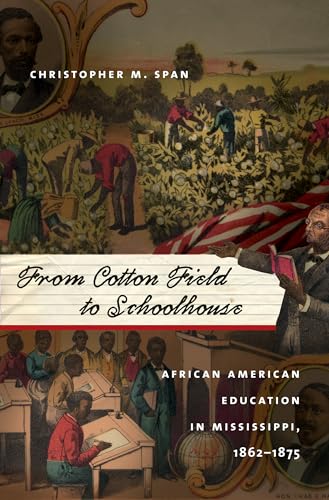From Cotton Field to Schoolhouse
African American Education in Mississippi, 1862-1875
Christopher M. Span
BOOK REVIEW

The pages of history are often inked with tales of struggle, resilience, and the fervent desire for knowledge. From Cotton Field to Schoolhouse: African American Education in Mississippi, 1862-1875 by Christopher M. Span is not merely a book; it is a stirring testament to the indomitable spirit of African Americans in the post-Civil War South. This work thrusts readers into a transformative era where the thirst for education became a beacon of hope and empowerment amidst the horrors of systemic oppression.
As you delve into Span's narrative, you are transported to a world where the confines of plantation life clash violently with the aspirations of a community eager for enlightenment. The period after the Civil War marked a pivotal moment for African Americans, who, by the force of their will, sought to redefine their identities through education. Span meticulously documents the establishment of schools, the fights for educational rights, and the triumphs and tribulations faced by both teachers and students. Through his deft storytelling, he renders their experiences vivid, breathing life into statistics and dates that so often lack emotional weight.
But what does this book evoke in you? The stories of young children, no longer relegated to the fields, bouncing between dreams of becoming doctors, lawyers, and even teachers themselves will ignite a fire within. The joy of learning is palpable, akin to the first rays of sunlight breaking through a dark, stormy sky. Their struggles are not just historical footnotes; they echo modern-day battles against educational inequities. Can you feel the weight of their resolve?
Critics have lauded Span's work for its rigorous research and compelling narrative. However, some argue that his focus on educational triumphs may overshadow the broader systemic issues still faced by African Americans today. Yet, isn't that the essence of hope? The undeniable belief that progress, however incremental, can emerge from oppression. The strength of the human spirit shines brightly in every chapter, urging readers to recognize this journey was not in vain but rather a foundation for future generations.
Moreover, Span's exploration of the role of African American educators, the unsung heroes who often committed personal resources and faced violent backlash to gain knowledge for their community, is both heartbreaking and inspiring. As you read their testimonies, alongside the historical context that Span provides, be prepared for an emotional rollercoaster-one that compels you to ponder the sacrifices made for the privilege of learning. Each story is a poignant reminder that education, once a luxury, is now a right that demands attention and advocacy.
The author does not shy away from the ugliness of history either. He frames the racial tensions that accompanied the establishment of schools, painting a vivid picture of resistance against long-held beliefs that sought to keep African Americans in a subordinate position. It's a challenge to digest-not just the facts, but the emotional weight they carry. This tension is masterfully woven into the fabric of his narrative, demanding that you confront the complexities and contradictions of American history.
In essence, From Cotton Field to Schoolhouse beckons you to reflect deeply on the value of education and the cost at which it comes. It amplifies voices long silenced and turns the lens on a crucial chapter of American history that remains too often overlooked. By the time you close this book, be prepared to feel invigorated and compelled to honor the legacy of those who fought tirelessly for the light of knowledge. Their struggles forged paths that allowed individuals like W.E.B. Du Bois and countless others to rise, pushing forward the cause of equality and justice, not just for African Americans but for society as a whole.
This book won't just inform you; it will transform you. The journey from cotton fields to schoolhouses is not merely historical-it resonates, reverberating through time and calling us to action in the present day. Don't miss this opportunity to immerse yourself in a narrative that transcends its pages to touch the core of what it means to strive for an education in the face of adversity.
📖 From Cotton Field to Schoolhouse: African American Education in Mississippi, 1862-1875
✍ by Christopher M. Span
🧾 272 pages
2014
#from #cotton #field #schoolhouse #african #american #education #mississippi #1862 #1875 #christopher #span #ChristopherMSpan